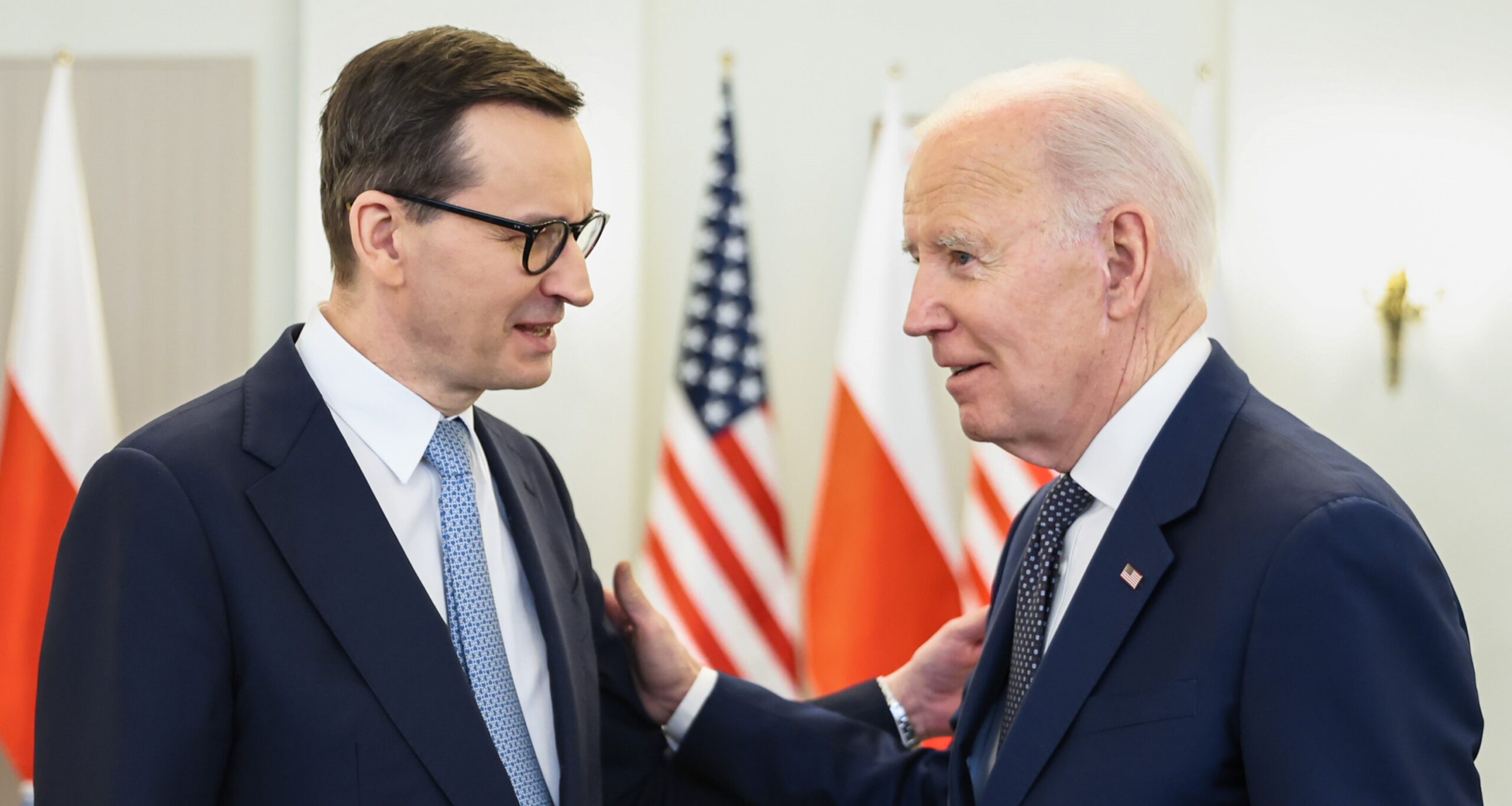“I’ve received signals from US” that opposition threaten Polish-American relations, claims PM

Poland’s prime minister says he has “received signals from the American side” that recent announcements by the opposition could weaken relations with the US. He claims that an opposition victory in this Sunday’s elections would damage the alliance with Washington and make Poland dependent on Germany.
Mateusz Morawiecki did not provide any evidence of US concerns nor said whom they were expressed by. Throughout the election campaign, his ruling Law and Justice (PiS) party has sought to portray Civic Coalition (KO), the main opposition group, and its leader Donald Tusk as beholden to German interests.
Poles have a choice between the “Polish” ruling party and the “German” opposition led by @donaldtusk, says Jarosław Kaczyński.
„Germany’s current intention is for us to be subordinated to them. We do not want to be under anyone’s boot. We have to resist” https://t.co/MnWADW8RxU
— Notes from Poland 🇵🇱 (@notesfrompoland) September 26, 2022
The prime minister made his claims in an interview published this week by Gazeta Polska, a conservative newspaper supportive of the ruling party.
“In recent weeks, I have received signals from the American side that the announcements by members of the Civic Coalition regarding the abandonment of [Poland’s] nuclear program may weaken Polish-American cooperation and therefore threaten Poland’s security,” said Morawiecki.
His government has pursued plans to create Poland’s first nuclear power plants, one of which will be built in cooperation with the US. American entities are also part of a consortium developing nuclear small modular reactors (SMRs) that will be located in Poland.
Premier dla „GP”: Miałem sygnały od Amerykanów, że zapowiedzi polityków KO mogą osłabić współpracę Polska-USA.
Więcej na https://t.co/elwAa96aXC #NiezaleznaPL https://t.co/8NK8QFNAoW
— Niezalezna.PL (@niezaleznapl) October 11, 2023
The prime minister’s mention of announcements made by members of KO is likely a reference to remarks last week by Urszula Zielińska, an election candidate from the Greens (Zieloni), a small party that belongs to the Civic Coalition.
She claimed that there was “consensus” within KO that, if they come to power, they would immediately reassess the PiS government’s nuclear plans, in particular how they will be financed.
When the interviewer noted that contracts have already been signed with American partners, Zielińska said that “We need to find out how binding the contract is and what penalties we face for breaking or withdrawing from it”.
Czy Donald Tusk kolejny raz wpycha Polskę w łapy Putina⁉️
Nr 2 na liście w Warszawie z Koalicji Obywatelskiej przyznała, że jest dogadana z Tuskiem w temacie zrewidowania w pierwszych 100 dniach umowy z USA na budowę elektrowni jądrowej i rozważają ją wypowiedzieć. 😳 pic.twitter.com/uST2uyWIVA
— Maciej Stańczyk (@stanczykmaciej) October 3, 2023
Other members of the Polish greens have also expressed concern about plans to build nuclear SMRs. However, Tusk himself – whose Civic Platform party dominates KO – said earlier this year that he strongly supports nuclear energy.
“We had a bit of a dispute, we discussed it with the Greens, but I won’t change my mind,” he told a meeting with students at the University of Opole in March.
“I believe that if we really want to move away from…coal-based energy in Poland, we will not replace it with 100% renewables,” said Tusk. “We must decide on nuclear energy.”
The Green party has raised concern over the proposed construction of a nuclear small modular reactor in Kraków
They argue the technology, which is still in development, is not sufficiently tested and produces large amounts of nuclear waste https://t.co/3zf9CMlMIi
— Notes from Poland 🇵🇱 (@notesfrompoland) May 17, 2023
Morawiecki, however, suggested that Tusk is actually opposed to nuclear due to pressure from Germany – which has moved away from nuclear over the last decade and has expressed concern about Poland’s plans – and France, which he says does not like the fact that the Polish government has chosen American partners.
“I perceive the announcements of opposition representatives as an element of the policy pursued by Berlin and Paris,” he claimed. “According to Tusk’s team, we are to obey the orders coming from there.”
“It is worth making our American partners aware of this entire situation,” added the prime minister. “I have no doubt that if the opposition comes to power, it will not only abandon implementation of the nuclear project, but also agree to close our strategic energy enterprises and make Poland dependent on energy from Germany.”
If Poland moves ahead with nuclear power, Germany will use „appropriate legal instruments at the European level”, says environment minister @SteffiLemke.
In Berlin’s view, nuclear is „neither good nor safe”, she added during a visit to Warsaw https://t.co/zIV6nfahIr
— Notes from Poland 🇵🇱 (@notesfrompoland) February 23, 2022
While he provided no evidence for this claim, Morawiecki argued that, during Tusk’s term as prime minister from 2007 to 2014, he “pursued the German interest without any scruples or doubts…Tusk did everything that his partners from Berlin wanted”.
That included following Germany’s desire to increase cooperation with Russia, said the prime minister, whose government this year set up a special commission to investigate Russian influence on public officials.
“This man [Tusk] is doubly dangerous: firstly, because he threatens the stability of the alliances between Poland and the US, and secondly, because…he is able to enter a level of cooperation with the Russians that is reminiscent of the times of communism,” Morawiecki told Gazeta Polska.
Notes from Poland is run by a small editorial team and published by an independent, non-profit foundation that is funded through donations from our readers. We cannot do what we do without your support.
Main image credit: KPRM (under CC BY 3.0 PL)

Daniel Tilles is editor-in-chief of Notes from Poland. He has written on Polish affairs for a wide range of publications, including Foreign Policy, POLITICO Europe, EUobserver and Dziennik Gazeta Prawna.






